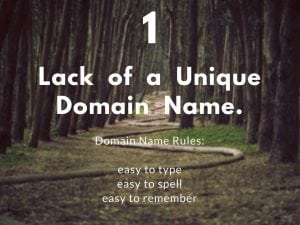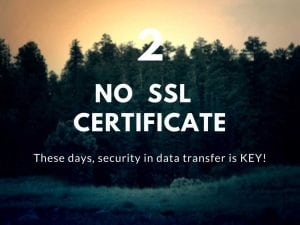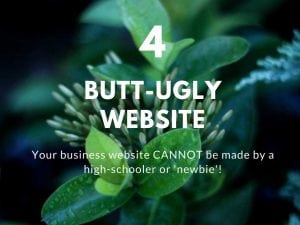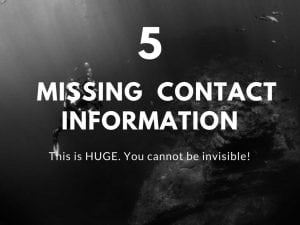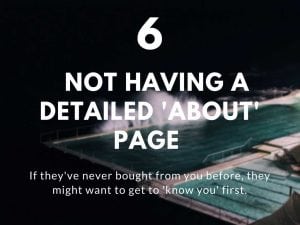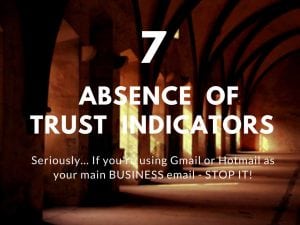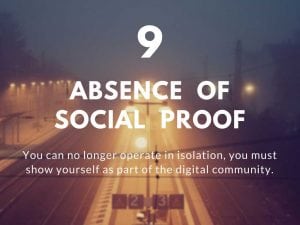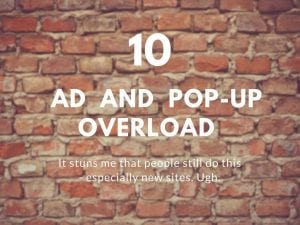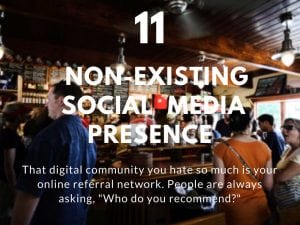01 Jul 11 Reasons Why People Don’t trust Your Website
Introduction –
If you’ve been in business any length of time, then you know this to be true: People buy from those whom they feel that they Know and Trust.
In the reverse, it simply means that if someone doesn’t feel like they can trust you, they’re not going to buy from you. Wouldn’t you agree?
Here’s another way to look at it… every day, all day, thousands of people all around the world are being scammed out of their hard-earned dollars, by buying into scam products and services. Why? Because it looks like a good ‘opportunity and they Trust in what they’ve been told.
And it makes no difference how good or how bad the product / service is! It all come down to Trust.
In this list of 11 things why people “don’t” trust your website, you’ll find 11 things that you can quickly evaluate against your own site to see if you’re building trust with your customers or losing it.
1. Your domain name.
Often, people are going to see your domain name before they see your site. What does your domain name say about your – about your business?
Ideally it should say ‘what you do’ and ‘where you do it’ – but – it cannot be too long. It also cannot look like the spammy domain names of the early naughties when internet marketers used ‘exact match’ domain names to try and game the SEO system. These days, exact matching keyword domains are a negative in the eyes of both Google AND the customer.
A good domain name is the starting point for building trust.
2. No SSL certificate.
There’s no excuse these days for not having an SSL certificate. This is the extra layer of security that, while once reserved for online shops, is now an essential element for every website.
The SSL certificate helps protect data transfer between the customer and the website and the server.
Google considers them so important that they’ll penalise you in search now days if you don’t have one.
3. Slow loading time.
We’re in a hurry these days. We can’t wait to get to where we’re going. And for our customers it’s no different. They want fast loading pages without exception.
Google’s “standard” is 3 seconds. Fortunately, most customers are OK with 4 – 5 seconds.
However, if you don’t get this right, chances are you’ll never get the opportunity to do more. You just blew it!
4. Butt Ugly Website
Think back a moment to the last few websites you visited – did you notice anything ‘particular’ about them? Probably not. That’s because their design was “as expected” and they performed as needed.
In our current modern / critical world only the exceptional stands out for good. These are rare. But the bad… the poor, the faulty – people LOVE to pick on them and share their negative feelings.
Yes, it’s a sad state of affairs, but if your website doesn’t meet the expectations of the modern consumer, it’s going to look tardy and out of date.
There’s nothing worse in the customers eyes!
5. Insufficient Contact Information.
My own pet hate is not being able to contact an actual ‘person’ when I’m trying to contact a business. Sure, there may be a contact form; but often that’s all there is. No name, no phone number, and no email!
Seriously? WTF people? You’re in business to BE in business! Don’t try and hide behind the anonymity of your website. Get your face (some someone else’s) out there as the ‘face of your business’.
They don’t even have to be a real person – they just must BE.
6. Your ‘About’ page.
Often, when contacting a new business, I’m looking to buy from, I’ll take a moment to read their ‘about us’ page. I want to know who I’m dealing with, what experience they have, and what they say / think about themselves is very important to many customers.
The ‘about’ page at PaulBarrs.com is has been consistently one of the top 10 most visited pages for many years. It’s a great way to build trust.
Perhaps it’s about time you updated your “about page”.
7. Trust Indicators
There are literally dozens of different trust factors that you an implement on your website; this article talks about the most important – but let’s not also forget other – easy to fix – trust factors.
The first of these is – dear lord – please DO NOT use an @Gmail or @Hotmail email when dealing with your customers. You MUST use an @yourdomain email address. No excuses. No exceptions.
Others that are also easy to set up include a privacy policy, which has become even more important since the introduction of the GDPR. You should also include a guarantee – whatever yours is – and any case studies that you have (proof of your work / product in real life).
Also – PLEASE check your spelling. Oh my. This one is my own personal Achilles as my typing skills are quite average. It’s my own fault I know, but it’s a killer when it comes to building trust.
Lastly, can I ask that you don’t use “stock photos” on your site. You know the kind… those ones that show to ‘very happy people’ who are obviously not (for example) of Australian heritage – and yet Australian businesses use them every day to represent their own customers.
Stop it!
8. Low quality content.
You won’t find this on PaulBarrs.com. I very rarely publish work from outside bloggers and take great pride in every word spoken or typed here on my own personal website. It’s EVERYTHING towards building trust with my potential customers.
You should take the same level of care when it comes to crafting the content on your own website. And while it’s OK to have someone else write it for you, the buck stops with you. You’re the one who will lose out if your content sucks.
So, don’t just start with good content, finish with it as well. Update your website regularly and then invite previous customers, website visitors and email subscribers to come back and visit it.
You should even run a new Facebook ad for each new blog post, which targets recent visitors asking them to come back. It can cost just cents on the dollar to do this, and return ten, twenty, even 100-fold on your investment when they convert to customers.
9. Social Proof.
Social proof is different to social media, and while social media can play a part – social proof is more what others say about you.
Once upon a time it was just ‘testimonials’, which are great. But there’s also reviews, and discussion.
Social proof is what others say about you!
You need to find ways to engage and encourage people to tell others about your great product or service. Social proof is ‘word of mouth’ on steroids.
10. Ads and pop ups.
Oh my. So many horrible things that can go wrong.
While there’s nothing wrong with having ads for other services on your website, those ads should never be the focal point of any page. As soon as they are, you lose face in the eyes of the customer who begins to think that they’re only there because you want them to click an ad to boost your ad revenue.
Ugh!
The same for pop ups. Why on earth would you have a pop up asking me to subscribe to something the instant I arrive on your website?? I haven’t met you. I haven’t read anything about you? I may not know squat about your product or service and you’re sticking an ad or pop up in my face? Hell no!
Google hates this so much that for years now if you’re running a pop up on your home page for mobile view – you’ll get penalised in Google Search because of it. Google understands the balance between building trust and pissing people off.
You should too.
11. Social Media.
This one’s a kicker – make sure you have ALL your social media properties functioning and active (those relevant to your industry).
Pimp them out. Take ride in filling out everything you can about yourself and your business. Make it easy for customers to learn about you.
Then take the time to keep them active. Post someone new at least once a day. Yes. Once a day at minimum. It doesn’t have to be your content – just something – that your customers will find useful and interesting.
The more you can get people to engage in your social activities, the more people will trust you.
Hey, look at the millions upon millions who trust the Kardashian’s and other celebrities. Sheesh. Some people dote on their every word. You want people to fall in love with your brand in the same way, to become YOUR tribe.
Want to find out more? Watch the full video here >>

